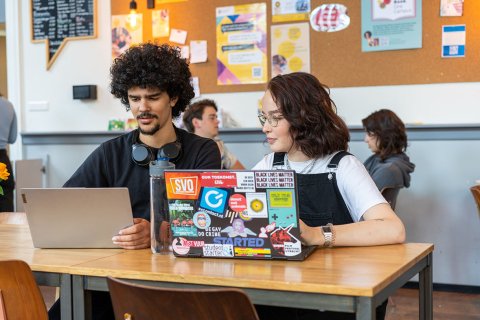Study programme
The research Master's programme Gender Studies (research) comprises two years (120 EC). Each year is divided into two semesters, running from September until January and from February until June. A semester is divided into two study periods.
Curriculum
The programme consists of compulsory courses, electives, an internship or study abroad and a thesis. Check the study schedule (PDF).
Year 1 | Compulsory courses
In the first you follow 25 EC of compulsory courses and 15 EC of interdisciplinary training and introduction to the field of gender research. You begin with a general course that familiarises you with the foundations of the humanities, and an advanced introduction to Gender Studies in the first study period. Throughout the first year the compulsory course trajectory offers you in-depth engagements with the broad field of women’s, gender, and postcolonial studies.
Year 1 | Academic specialisation (electives)
Focusing on your interests and ambitions, you can also take 15-40 EC of seminars and tutorials that will train you for research in a specialised topic or theme.
Year 2 | Study abroad or internship
In the first semester of your second year you can choose for a period of studying abroad (at UU partner universities or universities that are partners of the Graduate Gender Programme’s network). An internship can be of maximum 15 EC, studying abroad can be up to 30 EC.
The National Research School of Gender Studies (NOG) will offer courses throughout the year, in which you can take part according to your interests (10 EC).
Year 2 | Thesis
In the last semester you will complete your studies with a research thesis (30 EC). In this work you will contribute, on the basis of original and independent research, to a debate on gender, race, sexuality, class, religion and other socio-historical categories within your discipline. Examples of thesis titles:
- The Transparency/Opacity Conundrum: Locating Dutch Deportation Regimes at Schiphol Detention Center
- Queerness, Illness: The Psychosomatic Materialities of Pakistanis
- Postpartum as Portal: Reimagining Western Conceptions of the Human Through Linocut Printmaking Workshops on Postpartum and Motherhood
- Revenge Feminism: Tracing Global Punitive Demands in Spanish Gender Violence Legislation
- Moving (through) Intimacy: A Reimagination of the Self in Relation
- The Colonial Poetics of TikTok: Talking Dogs, Queer-Coded Cottages, and Getting to Know YourSelf through the Algorithm
Thesis Award

RMA student Rabeea Ahmad received the Hélène Phoa Gender Studies Research Thesis Prize 2022 with her thesis titled The Transparency/Opacity Conundrum: Locating Dutch Deportation Regimes at Schiphol Detention Center. Two submitted theses received a honourable mention: Muhammad Khurram, Queerness, Illness: The Psychosomatic Materialities of Pakistanis and Sophia Pekowsky, Postpartum as Portal: Reimagining Western Conceptions of the Human Through Linocut Printmaking Workshops on Postpartum and Motherhood.

Educational methods
- seminars (50%)
- group work (25%)
- self study (25%)
- internship (optional)
Examinations
- written assignments (academic papers, book reviews, research proposals)
- presentations
- creative assignments (elective)
- internship (optional)
- Master’s thesis
Extra opportunities
For students looking for an extra challenge in addition to their Master's, there are several options. Utrecht University offers several honours programmes for students looking for an extra challenge. Honours education is followed on top of your regular Master's programme and goes beyond the regular curriculum. Honours programmes are available at interdisciplinary level and allow you to work on projects that transcend your own discipline.

